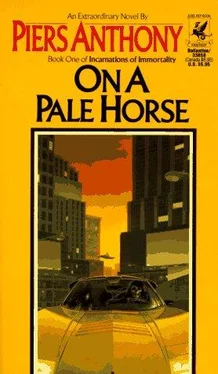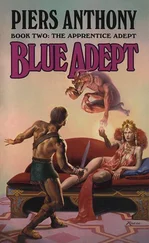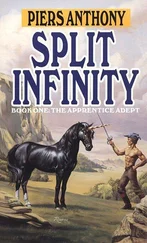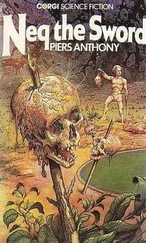"What refuge do these dead soldiers have?" Zane asked, discomfited. "How did this battle help them?"
"They have glory," Mars explained. "All men must die sometime, and most go ignominiously from age or illness or mishap. Only in war do large numbers get to expire in decent glory."
"Glory?" Zane thought of his recent client, impaled agonizingly on a wooden stake. "Seems more like gory to me."
Mars bellowed out his laughter. "Cute, Death! You perceive only the instant of discomfort; I perceive the eternal reputation. A moment of pain for eternal fame! These men are sacrificing their blood on the altar of righteousness. This is the termination that renders their entire mundane lives sublime."
"But what about those who die fighting for the wrong cause?"
"There is no wrong cause! There are only alternate avenues to glory and honor."
"Alternate avenues!" Zane exclaimed. "It's pointless brutality!"
"You speak of brutality," Mars said, as if pleased to meet the challenge of opposition. "You are as brutal in your own office, I believe. How many of your clients go sweetly to Eternity on blithe wings of song? I will answer that — damned few! Even your reforms are savage things, less defensible than what I offer my clients."
"Your clients are my clients!" Zane protested. "Your clients, my clients," Mars said, shrugging. He had excellently broad shoulders, making the shrug impressive. "Some coincide. Most don't. Consider the mode of executions. Do you approve of stoning a person to death, regardless of his crime, which may have been simply making time with a willing woman? Of crucifying him for his religious beliefs? Of breaking his body on the wheel because he stole a loaf of bread to keep himself from starving, or pulling his limbs off by means of chains attached to six horses because he refused to pay sufficient graft to get out of it, or burning him at the stake on a false charge of witchcraft?"
"No, of course not!" Zane said, taken aback by this savage catalogue. Mars had a rough-and-ready tongue! "But execution has been reformed."
"Reformed!" Mars snorted. "I remember the French reform. Doctor Guillotine invented a huge humane blade to sever necks quickly and cleanly. No more of this messy and sometimes inaccurate chopping that could cut into the shoulder or lop off the top part of the head or even take out the hands of the innocent person holding the condemned head in place. This modern method brought elitism to the poor, for before then only nobles had warranted execution by the sword. But do you remember what they did with that invention? I will inform you. They discovered that it could bring mass production to political murder! They could kill thousands in a day, chop-chop! The French Revolution became notorious for that humane reform!"
Zane didn't answer. Mars was too ready to fight.
They came to a ramshackle peasant house. A government soldier was passing it. Suddenly a child of about ten, a little girl, dashed out. The soldier swung his rifle around, but paused when he saw it wasn't a guerrilla. The girl rushed up to him, carrying something in her hands. As she reached him, she did something to the object.
"Hey — that's a grenade!" the soldier exclaimed, aghast.
The girl flung her arms about him, still clutching the grenade. The soldier tried to get hold of it, but she clung like a leech, her thin frame possessing the strength of fanaticism. Then the grenade detonated. She had armed it as she approached.
Pieces of the two of them sprayed outward. Blood splatted against the side of the house. "That was beautiful," Mars said. "That child brings great honor on her family."
"Honor!" Zane cried, outraged. "I call it horror!"
"That, too," Mars agreed equably. "They do tend to associate on such occasions. That's part of what makes even a minor fracas intriguing."
Another soldier appeared. He had heard the explosion and now saw the carnage. This one had a hand-held flame thrower. He ignited it and swung the flame around toward the house.
Another child, a boy, younger than the first, ran from the house toward the soldier. But the man played the flame thrower directly on him, and in an instant the child was a mass of fire. Then the soldier concentrated on the house, starting it burning.
There was a whimper from the smoking mass on the ground. "Your client, I believe," Mars reminded Zane.
How could he have overlooked this! The Deathwatch stood at zero and the arrow pointed at the boy. Zane hurried over and took the child's soul. The whimpering ceased. "What honor was there for this child?" he demanded.
"Not much," Mars admitted. "He failed in his mission. Failure does not deserve reward."
"That wasn't my point! Without this war, there would have been no deaths at all! I would never have been summoned. All this horror would never have existed!"
"On the contrary," Mars responded tolerantly. "Without this war, the oppression of this populace would have continued indefinitely, grinding the people down, dispossessing them of their property, starving them out. They would have died later, it is true, but in a worse manner — that of sheep led to the slaughter. Now they are learning to die in the manner of wolves defending their territory. Violence is but the most visible aspect of a necessary correction, much as an earthquake is a release of enormous subterranean pressures. Blame not the symptom, my good associate; blame the fundamental social inequities that stifle innovation and freedom and can be corrected in no other way. I come to right wrongs, not to wrong rights. I am the surgeon's scalpel that removes the cancer. My edge may hurt for a moment, and some blood may flow, but my cause is just, as is yours."
Zane found himself unable to refute the ready and roughhewn logic of Mars. But as he looked at the still-smoking little corpse of the child whose soul he had harvested, he feared it was not God whom Mars served so much as Satan.
"I think in due course you will find yourself at war," Mars continued. "I recommend that you prepare yourself for that occasion by familiarizing yourself with your weapon."
"My only weapon is the scythe," Zane muttered. "And an excellent one it is," Mars agreed. "Mortis!" Zane called, and the good Death steed appeared. Zane mounted and departed, without speaking again to Mars.
He arrived early, as he was doing more often now. The address was a rundown nursing home in a slum district in the resort city of Miami, wedged between a rickety dance hall and an old evangelistic church. The interior was gloomy and stank of urine. Old people sat unmoving, perhaps asleep. There were no games or magazines, and no conversations. The general mood was hopelessness. Zane didn't like such places and had fought to keep his mother out of one — too successfully.
His client was an old man with a white shock of hair and a dribble of brown where the corner of his mouth leaked. Zane walked toward him, but paused as he saw the rope. "You're tied to your chair!" he exclaimed.
The man looked up. "Otherwise I'd fall," he explained.
Zane realized that adequate facilities and competent attendants were beyond the means of this establishment. The poor and homeless could not afford a luxurious retirement.
"One favor," the man said. "If it is not too much to ask."
"If I can grant it," Zane said guardedly. "You know I can not grant a reprieve if it is a terminal illness that — "
"I'd like to have a hymn, to see me out."
Zane was surprised. "A hymn?"
"Holy, Holy, Holy. It's my favorite. I haven't heard it in years, and I miss it."
Zane wrestled with perplexity. "You want someone to sing a song?"
"Oh, a recording would be fine," the old man said. "Just to hear the sound. It's a great hymn! But I know my wish is foolish."
Zane considered. "It seems simple enough."
Читать дальше











